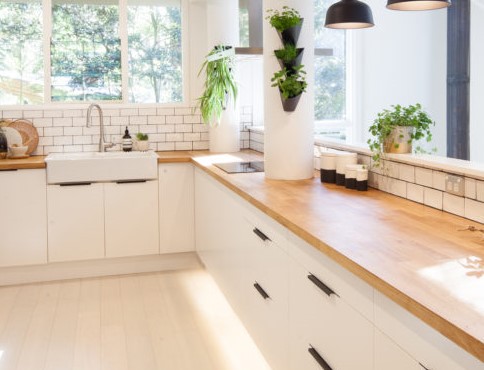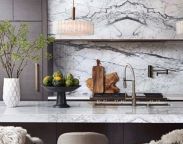
MARBLE
PROS: Marble benchtops are considered to be one of the most beautiful benchtop options and they certainly have a timeless beauty. It’s a natural material so each slab is unique in pattern and colour. It is also heat resistant as well as scratch and chip resistant.
CONS: Marble is very porous and will stain easily. It can be damaged by some general household cleaners as well as highly acidic food like lemon and vinegar. It should be resealed by a professional every few years.
PRICE: $800 to $2200 m2. Extra costs for sink cutouts and drainage grooves (around $250)
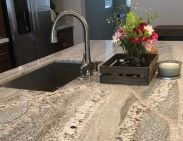
GRANITE
PROS: Similar to marble, granite benchtops are considered to be a high end option. They are a natural material so again, each slab will be unique in colouring and pattern. They are extremely durable in that they are heat resistant and scratch and chip resistant.
CONS: Porous – so it can stain and get damaged by some general household cleaners as well as highly acidic food like lemon and vinegar. It should also be resealed by a professional every few years.
PRICE: $700 to $1700 per m2. Extra costs for sink cutouts and drainage grooves (around $250)
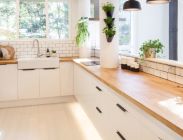
TIMBER
PROS: Timber is a beautiful, cost effective option which can be purchased from places such as Bunnings or Ikea. There is a huge variety to choose from (Bunnings alone has over 50 options). It is easy to cut, join and install and can be installed by your builder/carpenter vs a stonemason. It is particularly on trend at the moment for island benchtops and can bring warmth to a white or neutral kitchen. Timber benchtops can be refinished to remove stains and marks.
CONS: Porous and will absorb spills. Can scratch, chip and stain easily. Not heat resistant so you cannot put hot things directly on it. Can’t be used outdoors. Oil needs to be reapplied every year to remain effective.
PRICE: $550 to $950 per m2.
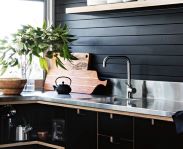
STAINLESS STEEL
PROS: Stainless Steel is a very hard-wearing and hygienic option. Splashbacks and sinks can be integrated seamlessly so no germs can get into seams. If you get a high grade thicker bench you can repolish every 5 to 10 years to make it look brand new. It is also heat-resistant and can be used outdoors.
CONS: You will see scratch and scour marks. It can also lack warmth unless combined with more organic materials such as timber.
PRICE: Approx $900 per m2.
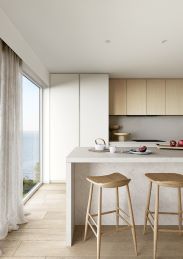
LAMINATE
PROS: Laminate has come along way in the last 20 years so is 100% worth considering for your renovation project. It is the most cost effective of all options. There is a huge range of colours and designs with many imitating other materials such as timber or stone. It is also stain resistant.
CONS: It is easily scratchd and can be stained and scorched. You can’t use it outsiide and if water gets in through seams it can warp.
PRICE: Approx $120 per lineal metre for a 600mm benchtop in standard finish up to $440 per lineal metre for a 1000mm to 1200mm benchtop in premium finish.
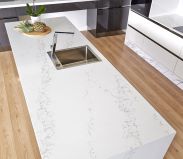
ENGINEERED STONE
Examples: Caesarstone, Silestone, Quantum Quartz, Essastone
Process: Made from crushed quartz held together with resin
PROS: The huge number of pros for engineered stone makes it one of the most popular choices for benchtops. It comes in a huge range of colours. Is very durable and easy to clean. It’s lighter than natural stone. The surface is non-porous and resists scratching and staining. It’s low maintenance and very hygienic. It’s stain “resistant” and has a 10 year warranty
CONS: Unfortunately, no benchtop is perfect. Engineered stone is sold by the slab which limits lengths to 300mm so you will have joins. It can chip so it’s recommended to pair it with low-profile, flush mount sinks so cut edges aren’t chipped or damaged by pots and pans. It can also discolour when exposed to sun so not good for outdoors. And it’s not heat resistant so it will scorch.
PRICE: Approx $1200 per 300mm x 1400mm slab for standard colours. Up to $4500 per slab for premium colours. Extra costs for sink cut-outs and drainage grooves.
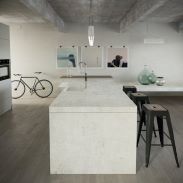
PORCELAIN & SOLID SURFACE
Examples: Dekton, Neolith
Process: Porcelain is powdered clay and coloured pigments. Solid Surface materials are raw materials including that of quartz mixed together. Both are and then put under extreme heat and pressure.
Types of Finish: Can be created with different textures and finished glossy or matte. Can be printed with finishes that resemble stone, timber, concrete and metal
PROS: As with engineered stone there is a very long list of Pros.
- It is extremely dense and non-porous
- Scratch resistant
- Resistant to heat
- Can be used outdoors
- Can be made in larger slabs than engineered stone and with thinner profile
- Doesn’t need to be sealed and resealed.
- Less expensive than engineered stone
- Companies like Dekton offer a 25 year warranty if professionally installed.
- “stain-proof”
- Water resistant
- Colour can be full body (but not patterns) so if they chip it will be the same colour
- Sink can be moulded into benchtop so there are no joins that can collect germs.
- Easy to keep clean.
- UV resistant so great for outdoors.
- Repairable so any burns etc can be fixed without replacing the entire benchtop.
CONS:
- Requires specialist tradespeople to cut and install
- Extremely heavy so you need to ensure cabinetry can take weight
- It can chip if something heavy drops on it (or completely shatter in some instances)
- Must be professionally installed
- Patters are printed on with ink so if a cut or groove is made on the surface the surface pattern will be removed.
- Because it is relatively new to the Australian market it has little competition and can therefore be quite pricey.
PRICE: Approx $1400 to $2200 m2. Installation will cost more than other benchtops
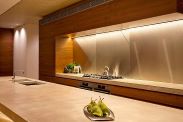
POLISHED CONCRETE
PROS: Unique look which isn’t as common as other options. Creates a design statement. Variety of colours, finishes and textures.
CONS: Due to weight you may require additional sub-floor structural work for support. Needs to be sealed to be water resistant and topical sealants aren’t heat resistant. Easily stained and prone to chips, scratches and hairline cracks
PRICE: Approx $1000 to $1750 per m2 depending on complexity of formwork and finish
![Renovate [2] Elevate](https://www.renovate2elevate.com.au/wp-content/uploads/2020/05/Renovate_Full_Washed_RGB-e1589871583510.png)
